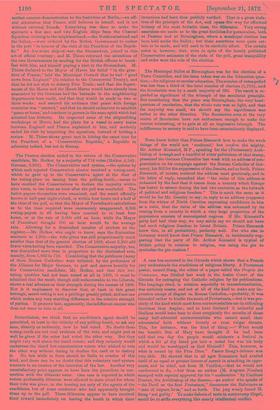A case has occurred in the Gironde which shows that
a French, jury understands the conditions of religious liberty. A Protestant pastor, named Steeg, the editor of a paper called the Progres des- Communes, was libelled last week in the Assize Court of the Gironde for outraging the Catholic religion by his publications.. The language cited, in relation especially to transubstantiation, was certainly coarse, and not at all of the kind to make any im- pression except of disgust on Roman Catholics,—probably, it was intended rather to kindle the scorn of Protestanta,—but it was pre- cisely of the kind which most keen controversialists use in ridiculing doctrines they despise ; and to have declared it unlawful and libellous would have been to close completely the mouths of those- many half-educated controversialists who cannot assail their adversaries' faith without homely or even vulgar thrusts. This, for instance, was the kind of thing :—" What would the humble Son of Mary have thought if he had been told that one day the people would celebrate a festival in which a bit of dry bread put into a metal box was his body and would be worshipped as God Himself ? This, however, is what is meant by the Fête Dieu." Pastor Steeg's defence was very able. He showed that in all ages Romanism had availed itself of an equal or greater licence of speech in attacking its oppo- nents, and he cited, not from M. Veuillot,—that he would not condescend to do, —but from an author (M. Auguste Nicolas) stamped with especial approval for his " moderation " by Cardinal Donnet, the Archbishop of the diocese,—an author who speaks of "the Devil as the first Protestant," denounces the Reformers as "men of impure lives," and so forth. The jury wisely found M. Steeg not guilty.' To make defects of taste in controversy illegal, would be to stifle everything like manly intellectual conflict.


































 Previous page
Previous page